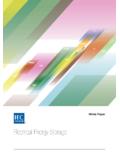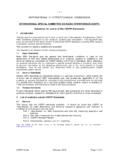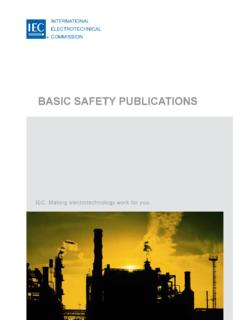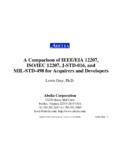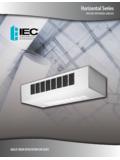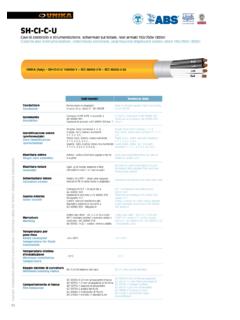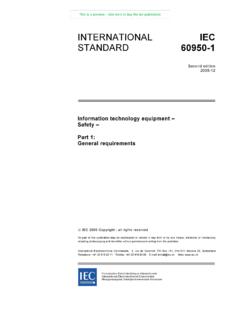Transcription of IEC code of conduct for delegates and experts
1 IEC code of conduct for delegates and experts 3 General introductionThis document provides brief guidelines on a number of issues which delegates and experts may be confronted with as participants in the IEC Standards process. It provides information additional to that given in the ISO/IEC Directives (all parts) and reference should be made to these for the beginning of each Technical Committee (TC)/ Subcommittee (SC) meeting, the chair should draw the attention of delegates to this document as follows: delegates are reminded that general guidance on the conduct of delegates and experts taking part in IEC meetings and contributing to IEC work is given in the document IEC code of conduct for delegates and experts , available on the IEC website.
2 4 conduct in meetingsThere are broadly two types of meetings that you may find yourself taking part in: TC/SC meetings and Working Group (WG), Project Team (PT), Maintenance Team (MT), ad hoc Group (ahG) a TC/SC meeting you take part as a delegate, as the official representative of the National Committee which has appointed you. That means you have the obligation to present the views and take position on issues as instructed by your National Committee. Normally, prior to a TC/SC meeting, your National Committee will have held a meeting of its national mirror committee where these issues should have been discussed and instructions given to the delegates attending the TC/SC a WG/PT/MT/ahG meeting you take part as an expert , appointed by your National Committee, but acting in a personal capacity and not as the representative of your National Committee.
3 You may obviously be requested to make reports on your activities within such groups to your any meeting you will find people from around the world, with different cultural practices on conduct in meetings. You will therefore need to be tolerant of other procedures and practices. The Chair is responsible for running any meeting and it is therefore important to let him/her carry out this task. There should be an agenda for all meetings and discussion should revolve around each individual item on the agenda. Do not try and start discussion on other issues.
4 Do not speak at a meeting unless the Chair has given you the floor, that is he/she has given you the right to speak. If you want to speak, attract the Chair s attention, by either raising your hand or if you have a name-plate, raise is the working language in the IEC, however it is not the first language of most participants. If you are a native English speaker, be prepared to make concessions to others. Speak clearly, use short sentences, avoid metaphors, irony and be aware that jokes and humour may not translate very use of breaks and informal sessions to talk with other delegates on issues.
5 You ll be surprised how often it is possible to reach agreement on matters which look intractable simply by having people with differing views discuss the matter informally. Be prepared to make concessions. A good meeting is one where everyone leaves satisfied with the results achieved and not where there are winners and on electronic social mediaSocial media (LinkedIn, Facebook, Twitter, etc.) can make a valuable contribution to spreading information about the IEC as well as contributing to the process of standards development, but they will only do so if they are used lines between public and private, personal and professional are blurred in online social media.
6 You are personally responsible for any content you publish on such media (and are not a representative of the IEC). Remember that anything you publish will be visible for a very long time, so protect your privacy. Don t say anything you might regret in five years time, or that you would prefer that your friends, family and colleagues didn t laws differ across the many jurisdictions where IEC meetings are held, so as to ensure compliance with local laws and regulations, participants may not record audio or video of any IEC meeting without the consent of all participants.
7 Any information posted to social media, discussion groups, or web sites may not name individual positions or companies when discussing events of the meeting. Whilst there s nothing wrong with disagreeing with someone or something, you should do so in a manner which is respectful and not copyright (see ). 6 What are the antitrust and competition laws? In the , it is called antitrust law, and elsewhere it is called competition law. But regardless of the label, most countries have substantially similar laws regarding any acts that result in unfair competition in the marketplace.
8 Generally speaking, most of the world prohibits agreements and certain other activities that unreasonably restrain trade. Competition authorities throughout the world uniformly condemn actions that are referred to as naked restraints on trade that is, agreements that do nothing more than limit competition between competitors. The classic examples that could arise in the standards process and the kinds of violation that most frequently result in criminal prosecution for the individual participants as well as their organisation include: price fixing (for example, where standards participants or other competitors agree on the prices that they will charge for compliant products); output restrictions (for example, where standards participants or other competitors agree on how much of a compliant product they will each produce).
9 Allocations of customers or territories (for example, where competitors agree on where or to whom they will each sell compliant products).There are many things you can discuss in standards meetings, but this is a non-exhaustive list of topics that you cannot discuss in IEC meetings: prices at which products or services implementing the standard should be sold ( price includes discounts, terms, and other conditions of sale); profits or profit margins; individual companies market shares or sales territories;Anti-trust, anti-competition issues7 allocation of customers, markets, production levels, or territories.
10 Or restricting the customers to whom, or territories in which, a company may sell or resell products; using standards or certification programmes to exclude suppliers or competitors from the marketplace for any reason other than cost-performance or technical considerations; conditioning the implementation of a standard on the implementer s use of products or services from a particular supplier [such as requiring use of a particular manufacturer s components or requiring implementers to use a particular service provider(s) for compliance certification]; bidding (or terms of bids) or refraining from bidding to sell any product or service.



